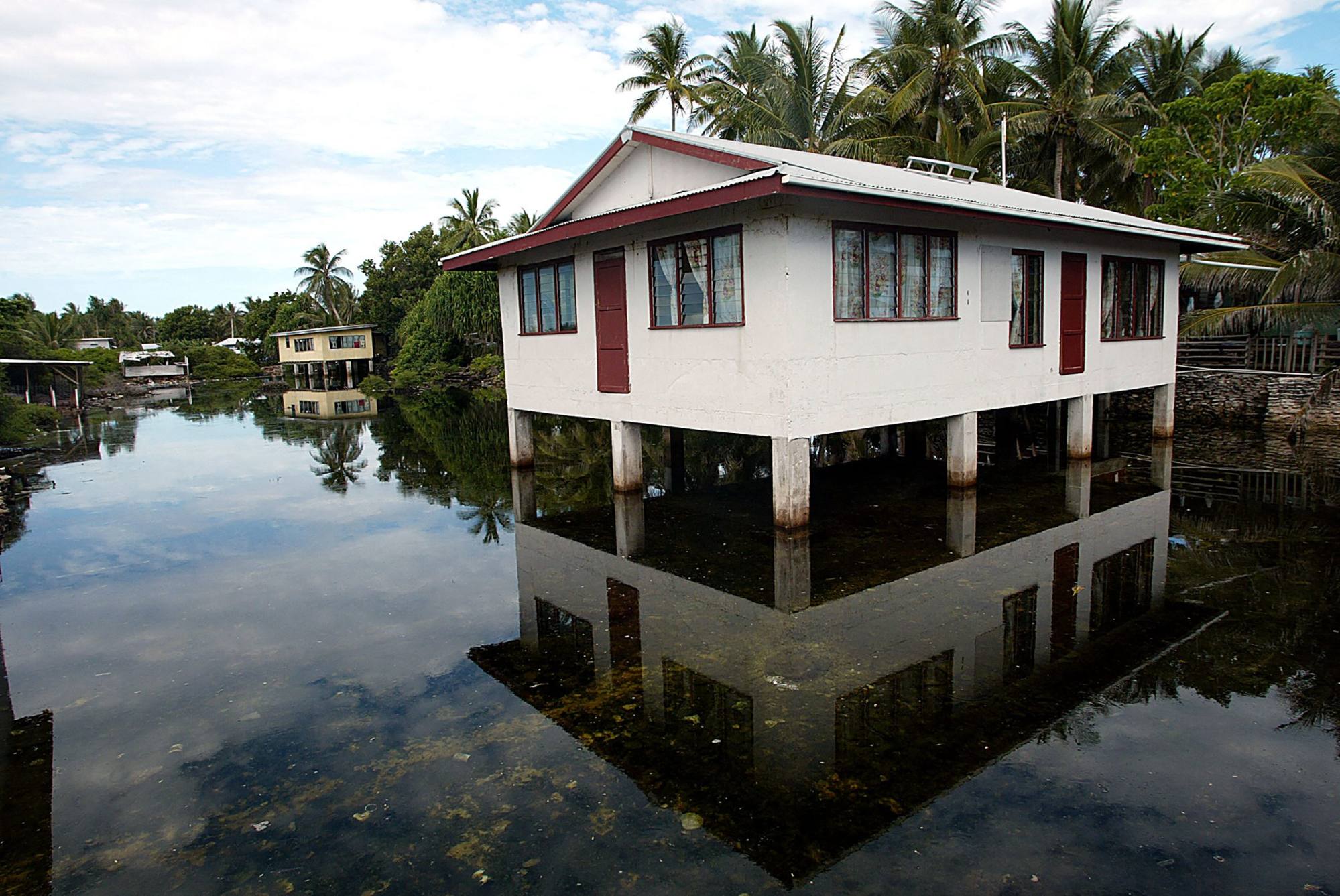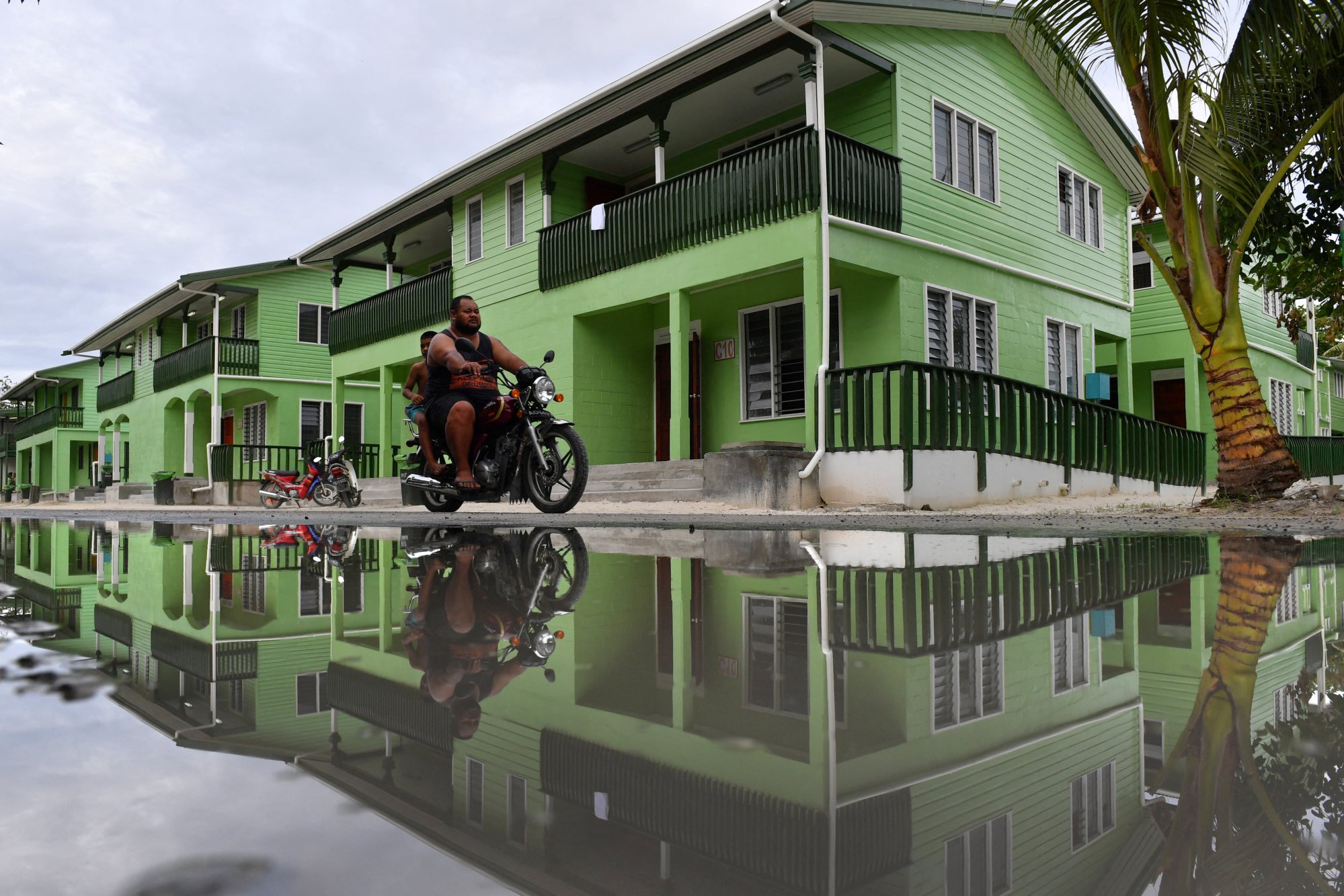Tuvalu’s climate deal with Australia comes with a ‘trade-off’ as China deepens Pacific ties
[ad_1]
Australia’s climate resettlement scheme with Tuvalu offers citizens of the sinking Pacific island a pathway to “migration with dignity”, but the defence conditions of the two countries’ upgraded ties show it is not a “free lunch” amid Beijing’s increased economic and defence activities in the region, analysts said.
The climate aspect of the deal validated what had been a long push for Tuvaluan migration into Australia, experts said.

“It is a safety valve for the most affected, and those in distress as a result of land loss and inability to sustain themselves in atolls,” said Patrick Kaiku, a political-science teaching fellow at the University of Papua New Guinea. “Tuvalu has in recent years been a strong advocate for climate justice, and it makes sense that it is a recipient of this climate refugee visa arrangement from Australia.”
Shailendra Singh, an associate professor in journalism at the University of the South Pacific in Fiji, said the deal was mutually beneficial, with mobility becoming increasingly vital for Tuvalu, and Australia keen to prove it is “part of the Pacific family” amid criticism Canberra had not met that promise.
But he noted that a condition in the pact was that the two sides must agree on any security or defence-related matters that Tuvalu might seek with other countries – a requirement likely pointed squarely at China.
Solomon Islands tells critics China police deal not a ‘threat’ to Pacific
Solomon Islands tells critics China police deal not a ‘threat’ to Pacific
Beijing’s increased defence and security dealings with Pacific nations in recent years have rattled Australia and allies such as the United States.
“This part of the agreement has the ‘C-word’ written all over it,” Singh said. “It’s well known that some of China’s economic activities and suspected military plans in the region are a major concern for Australia.
“In a way, it resembles a territorial contest. Every island country under your influence is a territorial gain and advantage. Critics would say it’s not a free lunch – it’s a trade-off – Tuvalu has to surrender some sovereignty,” he added.
Honiara earlier this year signed an agreement to cooperate with Beijing on law enforcement.

Since the Anthony Albanese government came to office in May last year, officials have paid several visits to Australia’s Pacific neighbours in an effort to mend and deepen ties, amid criticism that Canberra had long viewed the region through the lens of geopolitics to exclude new powers such as Beijing, rather than through the understanding of domestic priorities.
Kaiku said that although it was necessary for Australia to impose conditions on its relocation programme with Tuvalu, they echoed terms often used by the US and other nations concerned with “belligerent actors” in the region.
“[The conditions are] eerily similar to the ‘strategic-denial clauses’ one reads in the Compact of Free Association treaties that the United States has with its three Micronesian partners [the Federated States of Micronesia, Marshall Islands and Palau],” Kaiku said. “Australia is being cautious about other belligerent actors in the Pacific exploiting weaknesses with its partnership with Tuvalu.”
Australia’s deal with Tuvalu also includes Canberra deploying funds to help with a reclamation project that will increase Tuvalu’s land, that has been lost through rising sea waters, by around 6 per cent.
Cracks emerge in Pacific island unity as leaders skip meet amid US-China rivalry
Cracks emerge in Pacific island unity as leaders skip meet amid US-China rivalry
Singh said the resettlement policy appeared to be “a good move, although it has its critics who are concerned about the depopulation of Tuvalu given its smallness”.
Kaiku noted that other Pacific nations, such as Kiribati, had also long advocated for a “migration with dignity policy” with Australia. On Monday, however, Kiribati media said the island had played down replicating a similar deal with Canberra.
Former Australian ambassador to Papua New Guinea Ian Kemish predicted similar pacts would be forged.
“This is the kind of arrangement that Australian planners have been saying for years, to open Australia’s migration zone up substantially to the Tuvalu population. It’s not optics … my guess is there will be more of this,” said Kemish, who is also an adjunct associate professor at the University of Queensland.
[ad_2]
Source link

